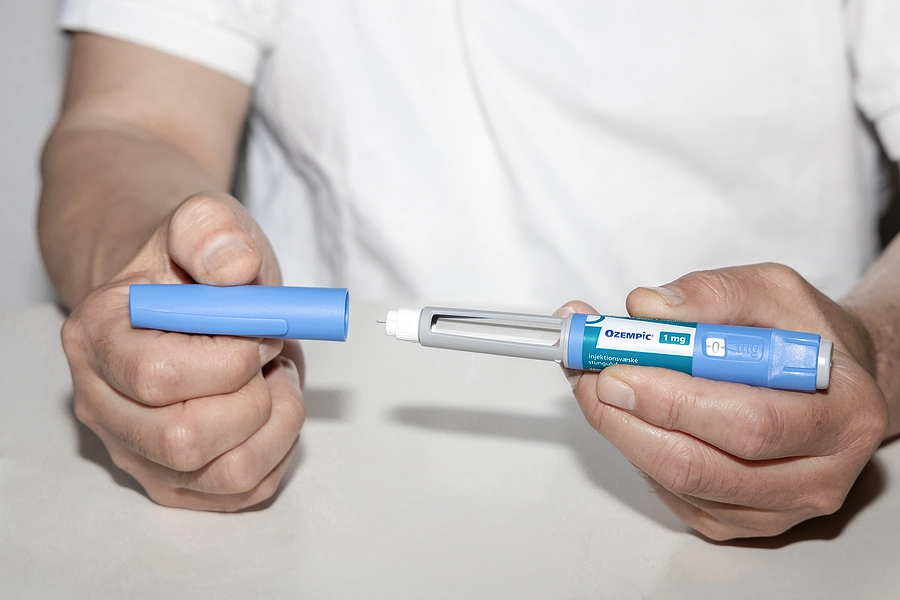Although a popular choice for veterans with Type II diabetes and weight issues, Ozempic carries a risk of considerable gastrointestinal damage, including stomach paralysis.
Summary
- Ozempic, a treatment vets use for service-related Type II diabetes and obesity, can cause serious side effects, which could impact VA disability compensation if it harms a veteran’s health.
- Healthcare providers may prescribe veterans Ozempic to manage Type II diabetes related to in-service toxic exposure or conditions affecting mobility and metabolism. Additionally, it is commonly used to treat obesity and induce weight loss.
- Veterans taking Ozempic might encounter side effects including gastroparesis (stomach paralysis), ileus, intestinal blockages, gallstones, biliary issues, and bowel obstructions due to the drug’s mechanism of slowing digestion.
- Veterans may qualify for increased VA disability benefits if Ozempic aggravates a service-related condition or causes a new disabling condition.
- VetLaw assists veterans in pursuing VA disability appeals for conditions resulting from Ozempic’s side effects.
Although many people are hailing Ozempic as a breakthrough treatment for Type II diabetes and weight loss, veterans should be aware of what the semaglutide drug could cost them.
With side effects including bowel obstructions, gallstones, and the paralysis of the stomach muscles, Ozempic is far from an easy fix for service-related conditions like Type II diabetes and obesity. Taking Ozempic for a service-connected medical issue may impact the VA disability compensation you can collect if it harms your health.
Veterans with questions about pursuing Ozempic stomach paralysis claims for VA disability benefits should get in touch with us as soon as possible. Call (855) 573-1503 or use a contact form to schedule a free consultation with a VetLaw VA-accredited attorney.
Why Veterans May Be Prescribed Ozempic or Wegovy
Ozempic is a drug treatment that encourages insulin production. Insulin is an essential component in the chemical process of converting glucose, or sugar, into energy. Veterans with insufficient insulin supplies due to Type II diabetes often have excessively high blood sugar.
Service-related physical and mental conditions that impact mobility, metabolism, or blood sugar regulation can cause a veteran to develop Type II diabetes. For example, a veteran with service-connected sciatica may be unable to lead an active lifestyle, or a veteran with a service-related phobia of being outdoors may become sedentary.
Without regular exercise, veterans are more likely to develop Type II diabetes, especially if other risk factors like poor diet and obesity apply. As a result, veterans may be prescribed Ozempic or Wegovy to manage their Type II diabetes.
A secondary, and increasingly popular, reason why providers prescribe Ozempic to veterans is to help them manage their obesity by losing weight. Although losing weight as an obese person can offer health benefits like reducing stress on the heart and increasing mobility, this is an off-label use of Ozempic.
Unlike Ozempic, Wegovy holds FDA approval to be used for weight loss in individuals with obesity. Note that there are medical criteria that dictate what qualifies as overweight or obese. Taking Ozempic or Wegovy without a medical diagnosis just to lose weight is not an official use.
Common Complications of Ozempic Veterans Encounter
Ozempic is a glucagon-like peptide 1 (GLP-1) agonist drug. Basically, that means it imitates GLP-1 peptides, which signal the body to ramp up the creation of insulin. However, regulating glucose that has already entered the body is just half of the equation when it comes to controlling blood sugar levels.
In order to be as effective as it is, Ozempic also attempts to reduce the user’s sugar intake. The semaglutide drug slows digestion so the user experiences a feeling of fullness after consuming less food. However, this has had the unintended consequence of causing the stomach muscles to freeze up during the digestive process.
Veterans on Ozempic may experience harmful side effects, including:
- Gastroparesis or stomach paralysis
- Ileus
- Bezoars and intestinal blockages
- Gallstones
- Biliary issues
- Bowel obstructions
The VA may provide compensation if your secondary condition caused by taking Ozempic for a service-related condition becomes disabling.
Can Veterans Get VA Disability Compensation if Taking Ozempic Caused Other Health Issues?
If you are a veteran who is taking Ozempic prescribed by a provider to treat a service-related condition, you may qualify for VA disability benefits. First, you must prove that using the medication caused your condition to worsen or you suffered a related health condition.
For example, say that you experienced Agent Orange exposure while serving in the Vietnam War, and that led you to develop presumptive service-connected Type II diabetes. Then, your provider prescribes Ozempic to help keep your blood sugar levels in check. After taking Ozempic, you suffer gastroparesis.
This exacerbates your existing Type II diabetes and causes severe acid reflux. The VA may increase your disability rating for Type II diabetes if your symptoms match a higher rating criteria. Additionally, you may be able to file a secondary condition claim if your acid reflux is serious enough to warrant a VA disability rating for GERD.
Learn Why Veterans Trust VetLaw With Their VA Disability Appeals After Suffering Ozempic Injuries
The Ozempic stomach paralysis claims are one of the major mass torts that affect veterans, and our team of VA disability claims lawyers has been a resource for them from the start.
At VetLaw, we prioritize our clients’ needs and work tirelessly to secure the best possible outcomes on their behalf. You can reach us at (855) 573-1503 or use a contact form to schedule a free consultation.
Frequently Asked Questions
Is it safe for veterans to use Ozempic for weight loss?
The FDA has not granted approval for Ozempic to be used for weight loss. Additionally, some studies have shown a greater likelihood of gastrointestinal complications among non-diabetic patients who took Ozempic to lose weight. Veterans who take Ozempic for reasons besides its intended purpose may be at a higher risk for harmful side effects.
Can I sue the company that makes Ozempic if I experienced stomach paralysis or gallstones?
Veterans may have product liability cases against Novo Nordisk, the manufacturer of Ozempic, if they experienced certain gastrointestinal issues after using the drug. There are questions as to whether the pharmaceutical manufacturer provided adequate warnings about the potential side effects of the drug to consumers.
It would be a breach of their duty if the courts decide that they did not. Therefore, the manufacturer may be liable for the damages of veterans who were harmed by Ozempic. Check out our page on Ozempic stomach paralysis lawsuits to learn more.
How common is Type 2 diabetes among veterans?
According to a 2023 NIH study of diabetes rates among veterans, a staggering 25% of veterans have Type II diabetes. Comparatively, only about 10% of the U.S. population has Type II diabetes. In-service toxic exposure and service-related injuries can put veterans at an increased risk for Type II diabetes.







